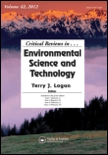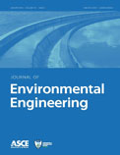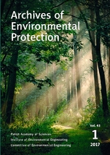
ENVIRONMENTAL SCIENCE AND POLLUTION RESEARCH
Scope & Guideline
Exploring Solutions for a Sustainable Future
Introduction
Aims and Scopes
- Environmental Pollution Assessment:
Research focusing on the detection, analysis, and assessment of various pollutants in air, water, and soil, including heavy metals, pharmaceuticals, and microplastics. - Sustainable Waste Management:
Studies exploring innovative waste treatment and management strategies, including recycling, bioremediation, and the use of waste materials in sustainable applications. - Green Technology and Innovation:
Research on the development and application of green technologies aimed at reducing environmental impact, enhancing energy efficiency, and promoting sustainable practices. - Climate Change and Environmental Impact:
Investigations into the effects of climate change on ecosystems, human health, and biodiversity, as well as strategies for mitigation and adaptation. - Ecotoxicology and Human Health Risk:
Research examining the toxicological effects of environmental contaminants on human health and ecological systems, including risk assessments and biomonitoring. - Renewable Energy and Sustainability:
Studies assessing the role of renewable energy sources in reducing carbon emissions and promoting sustainable development, including economic and policy analysis. - Ecosystem Services and Biodiversity:
Research focusing on the relationship between ecosystem services, biodiversity, and human well-being, including assessments of ecological health and conservation strategies.
Trending and Emerging
- Interdisciplinary Approaches to Environmental Challenges:
Research that combines multiple disciplines—such as ecology, economics, and engineering—to address complex environmental issues is gaining prominence. - Digital Technologies and Environmental Monitoring:
The integration of digital tools, such as machine learning and remote sensing, in monitoring environmental changes and predicting outcomes is a rapidly growing area of research. - Circular Economy and Resource Recovery:
There is a rising interest in studies exploring the principles of circular economy, emphasizing resource recovery and sustainable practices in waste management. - Microplastics and Emerging Contaminants:
Research on the occurrence, effects, and management of microplastics and other emerging contaminants is increasingly prioritized, reflecting growing public and scientific concern. - Climate Resilience and Adaptation Strategies:
The focus on developing and assessing strategies for enhancing climate resilience and adaptation in various sectors is becoming more prominent. - Green Finance and Policy Analysis:
The examination of the role of green finance and environmental policies in promoting sustainable development and reducing carbon emissions is emerging as a key area of interest.
Declining or Waning
- Traditional Pollution Control Methods:
There is a noticeable decrease in research centered on conventional pollution control methods, as newer technologies and approaches gain traction. - Single-Pollutant Studies:
Research focusing exclusively on single pollutants is declining in favor of studies examining multi-pollutant interactions and combined effects on ecosystems. - Static Risk Assessments:
The trend is shifting away from static risk assessments towards more dynamic and integrated approaches that consider multiple environmental factors and stressors. - Non-Technical Approaches to Environmental Issues:
There is less emphasis on non-technical, qualitative assessments of environmental issues, with a stronger focus on quantitative, data-driven research.
Similar Journals

International Journal of Environmental Research
Navigating the complexities of our natural world.Welcome to the International Journal of Environmental Research, a premier publication in the field of environmental science, published by Springer International Publishing AG. With an ISSN of 1735-6865 and an E-ISSN of 2008-2304, this journal has established itself as a vital resource for researchers, professionals, and students committed to advancing the understanding of environmental issues. Since its inception in 2007, the journal has maintained an impressive Q2 ranking in Environmental Science (Miscellaneous) and holds a notable 70th percentile position in the Scopus rankings, reflecting its high-quality contributions and reputation in the academic community. While the journal is not Open Access, it provides a platform for rigorous, peer-reviewed research covering diverse topics in environmental science, thus fostering a collaborative and informed approach to addressing global environmental challenges. Located in Switzerland at Gewerbestrasse 11, Cham CH-6330, the journal is committed to publishing innovative research that informs policy and practice, making it an essential reference point for anyone engaged in the study and management of the environment.

Global NEST Journal
Connecting disciplines to foster environmental understanding.Global NEST Journal, published by the GLOBAL NETWORK ENVIRONMENTAL SCIENCE & TECHNOLOGY, stands as a vital resource for researchers and practitioners in the field of environmental science. With its established trajectory since 2001 and a current category quartile ranking of Q3 in Environmental Science (miscellaneous), this journal serves as an important platform for disseminating innovative research and insights that address pressing global environmental challenges. Based in Athens, Greece, the journal is accessible to a wide audience, facilitating collaboration and knowledge sharing across disciplines. Despite its open access status being unspecified, the Global NEST Journal aims to enrich the academic community by publishing original research articles, reviews, and case studies on various aspects of environmental science and technology. By fostering a deeper understanding of complex environmental issues, this journal not only enhances academic discourse but also contributes to practical solutions for a sustainable future.

ENVIRONMENTAL ENGINEERING SCIENCE
Bridging science and practice for a healthier environment.ENVIRONMENTAL ENGINEERING SCIENCE is a leading journal published by MARY ANN LIEBERT, INC that provides a platform for pioneering research in the fields of environmental chemistry, pollution control, and waste management. With an ISSN of 1092-8758 and an E-ISSN of 1557-9018, this peer-reviewed journal aims to disseminate high-quality scientific studies that address critical environmental challenges. As evidenced by its 2023 category quartile rankings, it holds a notable position at Q3 in Environmental Chemistry and Pollution and Q2 in Waste Management and Disposal, highlighting its relevance and impact in these domains. Spanning over two decades from 1997 to 2024, the journal is dedicated to fostering innovations and promoting rigorous scholarship that can contribute significantly to sustainable environmental practices globally. Authors and researchers are encouraged to engage with this essential resource, which offers Open Access options to enhance the visibility and reach of their work. For those interested in advancing their understanding and practice within the environmental sciences, ENVIRONMENTAL ENGINEERING SCIENCE is an indispensable journal to consider.

Environmental Sciences Europe
Transforming environmental knowledge into action.Environmental Sciences Europe is a leading peer-reviewed journal published by SPRINGER, dedicated to advancing research in the field of environmental science, with a specific focus on pollution and its mitigation. Since its transition to Open Access in 2011, the journal has been committed to disseminating high-quality research without barriers, thereby ensuring that critical knowledge is freely accessible to researchers, practitioners, and policymakers around the globe. Based in Germany and with a commendable Q1 ranking in Pollution for 2023, the journal stands out in the Scopus rankings, occupying the 23rd position out of 167 in its category, reflecting its significant impact in shaping environmental discourse. With a convergence of global research efforts projected until 2024, Environmental Sciences Europe aims to provide a vital platform for scholarly communication and collaboration, ultimately contributing to sustainable solutions for pressing environmental challenges.

GLOBAL JOURNAL OF ENVIRONMENTAL SCIENCE AND MANAGEMENT-GJESM
Empowering interdisciplinary solutions for a sustainable future.Global Journal of Environmental Science and Management (GJESM), published under the distinguished leadership of Professor J. Nouri, is an esteemed academic platform dedicated to advancing the interdisciplinary discourse surrounding environmental science and management. With an ISSN of 2383-3572 and an E-ISSN of 2383-3866, GJESM has established itself as a prominent Open Access journal since 2014, allowing for unrestricted sharing of knowledge and research findings. Based in Iran, this journal caters to a diverse global audience, featuring contributions that span various critical domains including agricultural and biological sciences, environmental engineering, pollution management, and social sciences, evidenced by its impressive 2023 Q1 and Q2 quartile rankings across multiple categories. The journal’s Scopus rankings demonstrate a robust standing in the academic landscape, with exciting placements that underscore its relevance in key fields. By bridging the gap between scientific inquiry and practical application, GJESM serves as a vital resource for researchers, practitioners, and students seeking to understand and address the pressing environmental challenges faced by our planet today.

CRITICAL REVIEWS IN ENVIRONMENTAL SCIENCE AND TECHNOLOGY
Catalyzing Change Through Comprehensive ReviewsWelcome to CRITICAL REVIEWS IN ENVIRONMENTAL SCIENCE AND TECHNOLOGY, an esteemed journal published by Taylor & Francis Inc. This journal has been at the forefront of environmental research since its inception in 1993, spanning a wide range of disciplines including environmental engineering, pollution control, waste management, and water science. CRITICAL REVIEWS holds an impressive Q1 ranking in multiple categories, including Environmental Engineering and Pollution, demonstrating its critical role in advancing knowledge within the field. With a remarkable Scopus ranking—placing it in the top 1% for Environmental Science categories—this journal serves as an invaluable resource for researchers, professionals, and students alike, providing comprehensive reviews and analyses that catalyze innovative solutions to pressing environmental challenges. Though currently not open access, the journal's content is accessible through various academic platforms, ensuring that cutting-edge research is available to a global audience. Join the community of scholars dedicated to enhancing our understanding of environmental science and technology through rigorous investigation and critical discourse.

JOURNAL OF ENVIRONMENTAL ENGINEERING
Transforming knowledge into action for a greener tomorrow.JOURNAL OF ENVIRONMENTAL ENGINEERING, published by the American Society of Civil Engineers (ASCE), stands as a pivotal platform within the realm of environmental engineering and civil infrastructure. With an ISSN of 0733-9372 and an E-ISSN of 1943-7870, this esteemed journal has been delivering high-quality research since its inception in 1973 and continues to play a crucial role in advancing knowledge through to 2024. The journal boasts respectable impact factors, achieving Q2 rankings in Civil and Structural Engineering, Environmental Engineering, and Environmental Science, while also maintaining a solid presence in Environmental Chemistry. With Scopus rankings reflecting a strong competitive advantage across various specializations, it serves as a vital resource for researchers, professionals, and students focused on solving complex environmental challenges. Though not an open-access publication, its rigorous selection process ensures that only high-caliber studies are disseminated, making it an indispensable read for anyone involved in the interdisciplinary fields linking engineering and environmental sustainability. Addressing contemporary issues and shaping future innovations, the JOURNAL OF ENVIRONMENTAL ENGINEERING remains committed to fostering dialogue and disseminating impactful research.

Resources Environment and Sustainability
Driving Impactful Change Through Rigorous ResearchResources Environment and Sustainability is a premier academic journal published by ELSEVIER, dedicated to advancing knowledge in the fields of environmental science, engineering, and sustainability practices. Recognized for its rigorous peer-review and high-quality research, the journal boasts an impressive impact factor and consistently ranks in the first quartile across multiple categories, including Environmental Engineering, Environmental Science, Management, Monitoring, Policy and Law, and Pollution. With its Scopus rankings placing it among the top journals—#7 in Environmental Science and #12 in Environmental Engineering—this journal provides a vital platform for researchers, professionals, and students seeking to contribute to evolving policies, innovative management strategies, and cutting-edge environmental solutions. Hosted in the Netherlands, Resources Environment and Sustainability is committed to fostering interdisciplinary dialogue and disseminating high-impact research that addresses the pressing challenges of our times. This journal embraces open access principles, ensuring that the wealth of knowledge it publishes remains accessible to a global audience.

International Journal of Environmental Science and Technology
Leading the charge in sustainable technology research.International Journal of Environmental Science and Technology, published by SPRINGER, stands as a premier platform for the dissemination of cutting-edge research in the fields of environmental science, technology, and engineering. With an impressive scope spanning from 2005 to 2024, this journal serves as a vital resource for academic and professional communities engaged in tackling pressing environmental challenges. It boasts a strong reputation, evidenced by its Q1 ranking in Agricultural and Biological Sciences and solid placements in Environmental Chemistry and Engineering. Researchers searching for high-impact studies will find the journal's contributions significant, as reflected in its rankings within Scopus: 34th percentile in Agricultural and Biological Sciences and notable standings in Environmental Engineering and Chemistry. Although the journal is not currently an Open Access resource, it maintains a commitment to academic rigor and innovation, making it indispensable for those devoted to advancing knowledge in environmental sustainability and technology.

Archives of Environmental Protection
Unveiling the Complexities of Environmental ProtectionArchives of Environmental Protection, published by the Polish Academy of Sciences, is a pivotal journal in the field of Environmental Science. With an ISSN of 2083-4772 and E-ISSN of 2083-4810, this journal serves as a critical platform for disseminating innovative research and comprehensive reviews that address the complexities surrounding environmental issues. As of 2023, it holds a respectable Q3 ranking in Environmental Science, reflecting its relevance and contribution to the academic community, indicated by a Scopus rank of 124 out of 233 in the General Environmental Science category. Although it operates without Open Access, the journal's consistent publication from 2007 to 2024 emphasizes its commitment to advancing knowledge in diverse areas of environmental protection. Researchers, professionals, and students are encouraged to engage deeply with the wealth of insights offered through the rigorous peer-reviewed articles presented in this journal, which strive to foster sustainable practices and environmental stewardship.